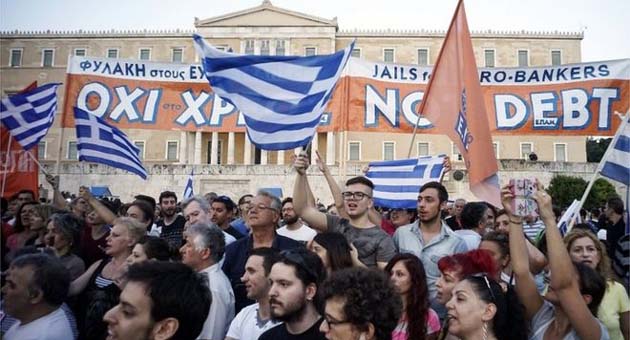Syriza’s decision to refuse the austerity deal offered by the Troika and to call a referendum on the proposals is a major step forward. It is a product of pressure from the left and the workers’ movement to stand firm on saying “no” to austerity. Dock workers have gone on strike against the privatisation of the ports and hospital workers on strike demanding funding to reopen and restore health services.
In the last week, tens of thousands have rallied across Greece in support of a “no” vote. A decisive rejection of the deal in Sunday’s referendum is the only way to ensure Greece escapes the burden of austerity and mass unemployment it has suffered since the beginning of the economic crisis in 2009.
Syriza was elected in January this year to end the crippling austerity measures imposed on Greece by the Troika, made up of the IMF, the European Central Bank (ECB) and the EU.
For five months it has been negotiating on new bailout terms. A temporary deal agreed in February required Syriza to continue existing austerity measures.
But the Troika demanded humiliation in return for new loans once the deal expired. Without a further bailout Greece will be unable to repay billions in loans from the IMF and the ECB. It has already missed one payment of €1.5 billion to the IMF.
Syriza had already gone back on many election pledges in the negotiations, signaling its willingness to accept new privatisations, postpone the increase in the minimum wage, cut pension costs and increase VAT (the Greek GST).
Greek Finance Minister Yanis Varoufakis admits that Syriza’s own proposals were “austerian”. But the Troika still demanded more, including increasing the retirement age and further VAT hikes that would hit the poor harder. And it refused to grant any debt relief as part of the agreement.
The negotiations have shown what the revolutionary left and some on the Left of Syriza have argued all along: there is no possibility of an end to austerity through the negotiations with the EU. The German government and the EU institutions are determined to continue the neo-liberal reforms that have been imposed across the Eurozone to cut government spending and push down workers’ wages.
Back to the table?
Prime Minister and Syriza leader Alexis Tsipras is calling on Greece to join him in rejecting the deal by voting “no” in the referendum.
But Tsipras and Syriza are still looking to continue the negotiations. On Wednesday Tsipras put a new offer to the EU, saying he would now accept most of the terms in the EU’s proposed deal with only minor changes. His only request was for debt relief as part of the deal. Germany immediately rejected this, saying there could be no more negotiations until after the referendum.
Tsipras has said that the day after the referendum he will be back at the negotiating table—whatever the result. In a speech he even claimed that a vote for “NO is a decisive step toward a better deal.”
These concessions damage the chances of winning the “no” vote, because they signal that the Syriza government is prepared to accept what they are asking people to vote against. They imply that there is ultimately no alternative to austerity.
But there is no indication the Troika is prepared to budge. They reacted with fury to the decision to call the referendum. Europe’s rulers are going all out to create panic and hysteria in Greece. Their cutting off of emergency credit – threatening to bring down the Greek banks – is used as a tool to impose chaos and fear.
European leaders insist that a no vote in the referendum means Greece will be expelled from the Eurozone. Tsipras has simply denied this, and expressed his determination to remain within the EU. But it is clear that EU membership and ending austerity are in fundamental opposition. When Syriza was elected many pointed to the 80 per cent support for EU membership in the Greek population. But as reality has proved, there is no way to do a deal that placates Europe’s rulers and repairs the living standards of the Greek people. Yet instead of facing up to this reality and arguing to break with the EU, Syriza’s position only confuses its supporters and gives the Right a powerful weapon.
So Syriza is caught between the Euro leaders’ demands and the pressure within Greece not to agree to more austerity. According to Yanis Varoufakis it would be “impossible to pass the institutions’ proposal through Parliament”. His own party and the workers who voted for them would not accept it.
A no vote has to be the first step to challenge Greek capitalism and the neo-liberal logic of the Troika that puts profits before workers, jobs, welfare, and living standards.
As the Greek anti-capitalist coalition Antarsya is arguing, it needs to be the start of a struggle to exit the European Union, nationalise the banks and fight for workers’ control.
The wealth still controlled by big business and the rich in Greece should be seized to restore workers’ wages, get public hospitals and schools running again and create jobs. But this will require workers’ struggle from below to resist the efforts of the international institutions and the rich inside Greece to create chaos and punish Greek workers. Key to the success of this is strengthening the influence of the revolutionary left. It is in the workplaces and on the streets that the fight to make the rich pay for the crisis must be won.
 Don’t miss meetings with Greek socialist Petros Constantinou
Don’t miss meetings with Greek socialist Petros Constantinou
As a member of the anti-capitalist coalition Antarsya, the Greek socialist organisation, SEK, and a councillor for Athens, Petros has been a part of the momentous struggle of Greek workers against austerity.
Melbourne:
Recession and austerity in Greece: Can Syriza solve the crisis?
6.30pm Tuesday 18 August, New International Bookshop, Trades Hall (Cnr Victoria and Lygon Sts, Carlton)
Europe and the rise of the far right: Lessons from the frontline in Greece
1pm Tuesday 18 August, 2nd floor Union House, Melbourne Uni
Keep Left conference, Sydney, August 22-23
Full details here






